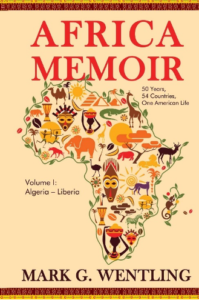Review — AFRICA MEMOIR by Mark G. Wentling (Togo)
 Africa Memoir
Africa Memoir
by Mark G. Wentling (Togo 1970-73)
Open Books Publisher
255 pages
August 2020
$9.99 (Kindle); $21.95 (Paperback)
Reviewed by Mark D. Walker (Guatemala 1971-73)
•
I’ve read and reviewed several of the author’s books over the years. We were both Peace Corps Volunteers in Central America and worked in West Africa, although Wentling went on to work and travel in 54 African countries over the years. My favorite book from his African Trilogy is Africa’s Embrace, which is fiction but reflects his experience working as a Peace Corps Volunteer in West Africa in the 1970s. The well-developed characters force the reader deep into the heart of Africa. Wentling worked with USAID and the State Department, so his book, Dead Cow Road, is an authentic and compelling work of historical fiction that focuses on the U.S. response to Somalia’s 1992 famine. Somalia is one of the most challenging, and often violent, countries in which to work in Africa, so this was a riveting tale.
This is the first book of a series about Africa and Volume I encompasses Algeria to Liberia. The author says that he grew up in Kansas, but was “made” in Africa. His half-century of work and living throughout the African continent provides a unique perspective on Africa and its diverse population. He describes his first-hand experiences and enlightening impressions, as he speculates on the prospects of some of the countries he knows best. He expresses his passion for Africa early on, “. . . all I write is based on a half-century of doing almost nothing except dreaming, thinking, reading, writing about, and working in Africa. In a nutshell . . . living Africa day and night for a lifetime.”
The author provides a unique overview of the continent, although by so doing, he often provides impressions based on a brief stay from the airport to an office/hotel and back. Over the years, the author has shared his experiences in Africa with his countrymen and has discovered that “. . . many Americans think of the continent of Africa as one country. He goes on to state that it has 1.2 billion people and is experiencing the world’s highest urbanization and population growth rates. “Africa also has a youthful population structure, with fifty percent of its people below the age of nineteen. Yet, it generally has the oldest leaders in the world.” I was surprised to learn that Nigeria is the most densely populated country in Africa and “will have more people than the U.S. in 2050 when it will be the third most populated country in the world.”
The author’s presentation on the country to the South, Liberia, is fascinating although the author doesn’t hold back on what he thinks of the U.S.’s foreign policies. He was in Liberia in 1985 when violence was breaking out and “watched the loss of its assets and the demise of a country it (the U.S.) had helped create and supported for over 130 years. The inaction on the part of the U.S. Government resulted in not only the destruction of Liberia but also the loss of hundreds of thousands of lives. The U.S. government had the opportunity to save a country and its people but declined to do so. Where is the honor in such inaction? If we cannot be a reliable partner in Liberia, why should any country in Africa rely on the U.S. government for assistance?”
Many Liberians were forced to flee the country, resulting in a large population living abroad and providing an important source of remittances. “On a percentage of GDP basis, Liberia has the highest rate of remittances in SSA. Perhaps, one-third of Liberia’s annual GDP is composed of remittances . . ..” this large funding stream points to the important role the diaspora from an African country can play in the development of their home country.”
As ambitious as this series is, it might not be the author’s last hurrah. In an interview at the end of the book, he says that at age 75, “I should retire and take it easy. But there are more books hammering at the inside of my skull, begging me to write more words that will result in their creation . . ..”
•
Mark Walker (Guatemala 1971-73) is the author of Different Latitudes: My Life in the Peace Corps and Beyond, as well as numerous articles. He writes for the “Arizona Authors’ Association Newsletter.” You can read more about him at MillionMileWalker.com.
Great review. Can’t wait to read this book!